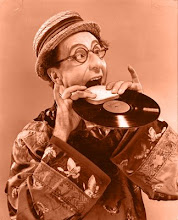No, the Third Banana isn't dead...
...but it's not feeling at all well. I'm short on time, especially in the wake of Hurricane Ike, and worse, my DVD player has fried itself which is putting the kibosh on new video content (sorry Geoff). Until I can scrape together the cash for a new DVD player, I'd like to draw your attention to some of the new Third Banana-y content now available at archive.org.
Lady of Burlesque (1943). Nothing against Pinky's 50s kidvid, but he's much more fun when playing to adults. He even gets the fade-out here. I can remember when I was willing to shell out good money for a crappy VHS copy of this film just so I could watch Pinky Lee in his burlesque prime and now here it is FREE on the internet. You kids today have it soooo easy.
Poor Daddy (1929). How's this for a rarity; a 1929 silent Chinese comedy feature. Poor Daddy is actually more of a melodrama than a proper comedy. Pretty fascinating but don't expect belly laughs. English and Chinese intertitles.
King Kelly of the USA (1934). In its original incarnation with Trem Carr at the helm, Monogram was easily Hollywood's most daring Poverty Row studio, producing mid-budget adaptations of literary classics such as Jane Eyre and Oliver Twist and slick crowd-pleasing dramas like The Avenger. King Kelly of the USA is probably Monogram's comedy masterpiece and, with its expansive sets, large cast, and clever script, could easily pass as an RKO or Paramount product. The giveaway is that Monogram's stars are the other studios' second-stringers, skilled stalwarts like Edgar Kennedy, Ferdinand Gottschalk, and Franklin Pangborn. A nice fit with other "crazy kingdom" movies of the early 30s (and it seems like Edgar Kennedy is in almost all of them). Probably unique for Monogram, King Kelly also boasts a brief animated sequence (around 20 minutes in) and if limited made-for-TV animation existed in 1934, this is precisely what it would look like. Anyone know who's responsible?
Lady of Burlesque (1943). Nothing against Pinky's 50s kidvid, but he's much more fun when playing to adults. He even gets the fade-out here. I can remember when I was willing to shell out good money for a crappy VHS copy of this film just so I could watch Pinky Lee in his burlesque prime and now here it is FREE on the internet. You kids today have it soooo easy.
Poor Daddy (1929). How's this for a rarity; a 1929 silent Chinese comedy feature. Poor Daddy is actually more of a melodrama than a proper comedy. Pretty fascinating but don't expect belly laughs. English and Chinese intertitles.
King Kelly of the USA (1934). In its original incarnation with Trem Carr at the helm, Monogram was easily Hollywood's most daring Poverty Row studio, producing mid-budget adaptations of literary classics such as Jane Eyre and Oliver Twist and slick crowd-pleasing dramas like The Avenger. King Kelly of the USA is probably Monogram's comedy masterpiece and, with its expansive sets, large cast, and clever script, could easily pass as an RKO or Paramount product. The giveaway is that Monogram's stars are the other studios' second-stringers, skilled stalwarts like Edgar Kennedy, Ferdinand Gottschalk, and Franklin Pangborn. A nice fit with other "crazy kingdom" movies of the early 30s (and it seems like Edgar Kennedy is in almost all of them). Probably unique for Monogram, King Kelly also boasts a brief animated sequence (around 20 minutes in) and if limited made-for-TV animation existed in 1934, this is precisely what it would look like. Anyone know who's responsible?
Labels: cinema, Edgar Kennedy, Franklin Pangborn, Pinky Lee
















